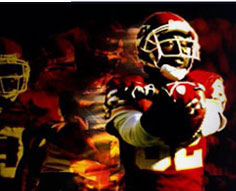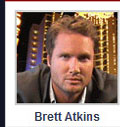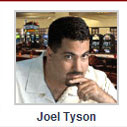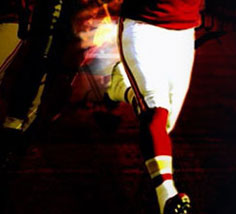Happy Birthday Walter Johnson--The Greatest Pitcher of All-Time!
http://www.cmgworldwide.com/basebal...n/biography.htm
With a remarkable amount of integrity, humility and talent never before seen in the Major Leagues, baseball’s greatest pitcher truly stood above the rest. Walter Johnson’s incredible speed and wholesome demeanor personified the golden age of baseball, earning him the country’s gratitude and respect.
Born in Humboldt, Kansas on November 6, 1887, Johnson was the second of six children to Frank and Minnie Johnson. Growing up on his parent’s farm, Johnson appreciated the lifestyle of a rural community, as he thought the isolation was the best preparation for life and a chance to learn more about himself. When Frank decided to move the family to California in 1901 to try their luck in the oil industry, Johnson decided to try his luck at baseball.
During his high school years in California, his aptitude for baseball surfaced. Like his peers, he played numerous positions but his fast arm motion made him a natural pitcher. Upon graduating from high school in the spring of 1905, the 17-year-old set out to play as a pitcher for the semi-professional Idaho State League. The word about Johnson’s skill quickly spread, attracting the attention of “Pongo Joe” Cantillon, manager of the American League team in Washington. Johnson, a product of small-town life, could not be persuaded to leave his rural surroundings for the erratic nature a big city possessed. Not the one to be turned away, Cantillon called on Washington catcher Cliff Blankenship a year later to sign up Johnson. With a hint of trepidation still in him, Johnson took the leap and arrived in Washington, D.C. in mid-1907 to begin playing.
The Washington Senators were only in existence for seven years when Johnson started. His first pitching assignment was against the Detroit Tigers. Even though the Senators suffered a loss, fellow baseball player Ty Cobb immediately recognized the young pitcher’s unbelievable ability. “The first time I faced him, I watched him take that easy windup – and then something went past me that made me flinch. I hardly saw the pitch, but I heard it. Every one of us knew we’d met the most powerful arm ever turned loose in a ballpark,” Cobb said.
Despite Johnson’s best efforts, he could not lift the ailing team, experiencing consecutive losses five years straight. However, in 1912, Washington sprang into second place as Johnson miraculously had a career season with 32 wins, 303 strikeouts and a 1.39 ERA. Even though the Senators struggled the rest of the decade due to a dearth of quality players being recruited, Johnson held his own. He garnered All-Star recognition in 1909, 1915 and 1918. He became the first pitcher in baseball to earn the prestigious Chalmers Award in 1913 and became the American League’s MVP that same year. In addition, Johnson was successful at winning the Triple Crown as a pitcher in 1913, 1918 and 1924. During the 1916 season he also pitched a record 369.2 innings without giving up a single home run…a record that still stands proudly today.
By the 1920s, Johnson knew he was on his career’s downside. Personal tragedy struck twice when, in July 1921, his father died of a stroke. Later that year, his oldest daughter died of influenza. Stricken with grief and now the oldest pitcher in baseball, Johnson considered retirement.
Johnson’s fans would not let him have his way. His career, while distinguished, still had yet to win a coveted World Series title. Fans knew that deep down, his passion for the game would some how let him keep playing.
He continued, and the 1924 season saw Johnson back in his true form, leading in winning percentage, strikeouts and ERA. Finally, after 17 seasons, the Senators made to the World Series. Prior to the 1924 opening World Series game, fans went wild, cheering for their favorite player. They presented him with the most expensive automobile then made in the United States: an $8,000 Lincoln touring car. President and Mrs. Coolidge were on hand as well as high officers of the Army, Navy and Marine Corps. To Johnson, no one was more important than his mother, Minnie, attending her first major league ballgame after all these years. The Senators, playing against the New York Giants, won the series 4-3. Washington went back to the World Series a year later, but their win could not be duplicated.
Johnson retired as a player in 1927 when he was unable to recover from a broken leg. He finished his 21-year career with 416 wins, 3,508 strike outs and a 2.17 ERA. Two years later, he was appointed manager of the Senators. He was replaced, and in 1933, selected to manage the Cleveland Indians. His easygoing disposition and tendency to let things slide, however, did not make him a suitable manager. Johnson then entered politics winning a seat as Montgomery County Commissioner in the state of Maryland. In 1940, he ran for U.S. Congress but was narrowly defeated. Johnson died at the age of 59 on December 10, 1946 from a brain tumor.
In honor of his contributions to the game of baseball, Johnson was elected to the Baseball Hall of Fame in 1936. It is only fitting that the greatest right-handed pitcher in history should be among the elite first group selected for enshrinement.

FAST FACTS
BIRTH NAME: Walter Perry Johnson
NICKNAMES: Big Train, Sir Walter, White Knight
BIRTH DATE: November 6, 1887
BIRTH PLACE: Humboldt, Kansas
DEATH DATE: December 10, 1946
DEATH PLACE: Washington, D.C.
BURIAL LOCATION: Rockville Union Cemetery - Rockville, Maryland
HEIGHT: 6' 1"
WEIGHT: 200 lbs
HAIR COLOR: Brown
EYE COLOR: Blue
THREW: Right
BATTED: Right
PLAYED FOR: Washington Senators (1907-1927)
ML DEBUT: August 2, 1907 (Facing the Detroit Tigers)
FINAL GAME: September 30, 1927 (Facing the New York Yankees)
POSITIONS: Starting pitcher (666 games), Relief pitcher (about 150 times)
HONORS: AL Most Valuable Player (1913, 1924), Hall of Fame Inductee (1936)
MANAGED: Washington Senators (1929-1932), Cleveland Indians (1933-1935)
JERSEY NUMBERS: #28 in 1931, #25 in 1932 (both as Senators Manager)
STRENGTH: Speed - most estimates place his fast ball at 97-99 MPH (7-12 MPH faster than most other great pitchers of his time)
HIGH SCHOOL: Fullerton Union High School - Olinda, California
PARENTS: Frank and Minnie Johnson
SIBLINGS: Five brothers and sisters
OCCUPATIONS: Baseball player (Senators), Baseball manager (Senators, Indians), County commissioner (Montgomery County, Maryland), Broadcaster (Senators games), Farmer (Germantown, Maryland)
MARRIED: Hazel Lee Roberts (1914)
CHILDREN: Three boys, two girls
DID YOU KNOW?
- A high school in Bethesda, Maryland is named after Johnson, the only high school in the United States named after a baseball player.
- When Johnson was playing baseball from 1907-1927, Major-League teams had not yet adopted uniform numbers. The Washington Senators first added uniform numbers in 1931, so for the first two years Johnson managed the Senators from 1929-1930, he had no uniform number. He wore #28 in 1931, and #25 in 1932, his last year as Senators' manager.
- Johnson was elected Montgomery County Commissioner in the state of Maryland in 1938 and ran for U.S. Congress in 1940, just barely losing to the incumbant.
- Walter was one of the first five players to be elected to the National Baseball Hall of Fame in 1936 along with Ty Cobb, Babe Ruth, Honus Wagner and Christy Mathewson.
- He was nicknamed “The Big Train” by sportswriter Grantland Rice, who was reminded of an express train by Walter’s size and the velocity of his pitches (some also say it was because he always seemed to be pulling his team along).
- He was sometimes referred to as “Sir Walter” and the “White Knight” because of his gentlemanly gamesmanship.
QUOTES ABOUT JOHNSON:
"The first time I faced him, I watched him take that easy windup — and then something went past me that made me flinch. I hardly saw the pitch, but I heard it... Every one of us knew we'd met the most powerful arm ever turned loose in a ballpark."
-- Ty Cobb, Detroit Tigers
"He’s got a gun concealed about his person. You can’t tell me he throws them balls with his arm."
-- Ring Lardner, sportswriter
"...arguably the greatest pitcher of all time."
-- Tim Kurkjian, sportswriter
"He had a slingshot delivery with nice, easy movement, which didn't seem to be putting any strain at all on his arm. But he could propel that ball like a bullet."
-- Fred Lindstrom, New York Giants
"You can't hit what you can't see."
-- Cliff Blakenship, Washington Senators
"His fastball looked about the size of a watermelon seed and it hissed at you as it passed."
-- Ty Cobb, Detroit Tigers
"There’s only one way to time Johnson’s fastball. When you see the arm start forward-swing."
-- Birdie McCree
"I felt sorry for him when we shook hands because his hand trembled so. I knew what he was thinking. He was thinking he mustn't let down the fans all over the country who were rooting, even praying for him."
-- Art Nehf, New York Giants
"Those last four innings of the world series comprise beyond all question the most dramatic stretch that sport has ever known... In the space of two hours, Walter Johnson had come from a lone, dejected and broken figure in the shadows of the clubhouse to a personal triumph that no other athlete had ever drawn in all the history of sport."
-- Grantland Rice, sportswriter
QUOTES FROM JOHNSON:
"I was the greenest rookie that ever was. One evening I was standing out on the sidewalk when a stranger approached and said, 'You're famous already, kid. See, they've named a hotel for you.' I looked across the street and, sure enough, there was a big illuminated sign that read, 'Johnson Hotel.' Well, do you know that I was so green that I actually believed the man?"
"I throw as hard as I can when I think I have to throw as hard as I can."
"The beanball is one of the meanest things on earth and no decent fellow would use it. The beanball is a potential murderer. If I were a batter and thought the pitcher really tried to bean me, I'd be inclined to wait for him outside the park with a baseball bat."
"Can I throw harder than Joe Wood? Listen, Mister, no man alive can throw any harder than Smokey Joe Wood."
AWARDS AND ACHIEVEMENTS
AWARDS:
• 1924 - AL MVP, All-Star and Satchel Page Award
• 1918 - All-Star Award
• 1915 - All-Star and Platinum Glove
• 1913 - AL MVP and Chalmers Award
• 1909 - All-Star Award
• 1908 - Platinum Glove
ACHIEVEMENTS:
• Struck out 3,508 batters (the most until Nolan Ryan broke his record in 1983)
• Led the Senators to the World Series twice (Won in 1924 and lost in 1925)
• Pitched the most consecutive innings without giving up a home run (369)
• One of the first five players inducted to the Baseball Hall of Fame in 1936
• The only pitcher in MLB history to win 20 games and hit .400 in a season
• Pitched 56 consecutive scoreless innings, a record that stood until 1968
• Career Earned Run Average of 2.17 which is seventh best of all time
• Won the Pitching Triple Crown three times (1913, 1918 and 1924)
• Career record of 417 wins (second best in history), 279 losses
• He was named #60 on ESPN's top 100 athletes of the century
• In 1913, became the first pitcher to win the Chalmers Award
• Led the American League in Earned Run Average five times
• Led the American League in strikeouts twelve times
• Led the American League in shutouts seven times
• Led the American League in total wins six times
• Ranks third all time in innings pitched with 5,923
• Ranks fifth all time in complete games with 531
• Ranks first all time in total shutouts with 110
• Had a lifetime winning percentage of .599
• His ERA was under 2.00 eleven times


































